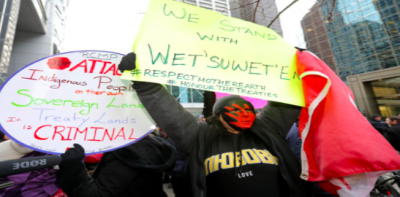Canada Oil Pipeline Contract Threatens Integrity of Mother Earth’s Native Peoples

In a law school dictionary the definition of a Philadelphia Lawyer is, “A very sly, crafty, shrewd lawyer who is an expert in the exploitation of legal technicalities”. No where more evident can this be seen than in Northern British Columbia where the integrity of Mother Earth’s Native Peoples is once again being threatened by the suspect legalese of an oil pipeline contract between Coastal Gas and the Wet’suwet’en people.
CBC Radio’s Early Edition programme aired on August 10th the latest of many disputes that have erupted in recent times between the Wet’suwet’en people and Coastal Gas over the extension of oil pipelines through their traditional territories. This latest dispute is over the provisions of an economic development agreement contained within a signed legal benefits contract between the Na’kazdli Whut’en First Nation Tribal Council and TC Energy’s Coastal Gas Pipeline project (“Benefits Agreement asks First Nations to discourage members from hindering B.C. Pipeline Project”, Chantelle Bellrichard, CBC news, Aug 9th, 2019). This legal contract, crafted, as some critics say, by slick ‘Philadephia Lawyer’ types, calls into question the very integrity of the human race’s rights to continue to abuse as it does not only the indigenous peoples of the earth but to abuse the inherent rights of Mother Earth herself.
The wording of this contract’s provisions apparently are designed to dissuade or muzzle the Na’kazdli people themselves from speaking out against the project as vociferously has been done in the past. The legal stipulations in that contract at a glance sound like a clear violation of the basic tenets of Freedom of Speech, as contained within Canada’s Charter of Rights & Freedoms as well as Canada’s Supreme Court Rights & Aboriginal Title Decision,which, in the case of the Wet’suwet’en people, the validity of both will require a decision by Canada’s Supreme Court.
In the meantime, to allow such questionable oil pipeline projects to continue to be consummated between corporate energy entities and First Nation peoples not only flies in the face of PM Justin Trudeau and Canada’s promise to all Canadians to lower the country’s greenhouse emissions but adds further fuel to the fire of the world’s climate crisis that is currently on the front burner of almost every nation in the world, and especially in countries like Canada, the U.S., U.K. and Australia that currently are, or recently have, held their national elections and debates over what direction future energy projects should take.
In another article (“Water Not Oil Battle Cry of the Blue Planet) produced by this writer, since posted on the sites of a number of alternative international news sources, Guujaaw, an Hereditary Chief Gidansta of the Haida Nation, and advisor to B.C.’s Coastal First Nations, is quoted, from an earlier National Observer article (“The Juggernaut of corporate oil must be stopped” June 18th 2019), as objecting to the concept of a proposed Aboriginal “Reconciliation Pipeline” as part of PM Justin Trudeau’s decision to approve the extension of the controversial Trans Mountain Pipeline from the Tar Sands of Alberta to the coastal waters of British Columbia and beyond.
Guujaaw raises several key points that must be repeated here within the context of this latest dispute between the Wet’suwet’en and Coastal Gas. Canada’s Supreme Court, historically, has called for “reconciliation” to honour the sacrifices many Aboriginal champions have made to defend and protect their lands ever since the birth of Canada as a nation of immigrants. Yet whenever Corporate Oil attempts to simply buy its way in, as apparantly once again has been done in the case of the Nakazdli people, while abrogating and over-riding the will of its people, Guujaaw makes the key point that, “A pipeline and all that comes with it crosses the “inherent limit” and does not carry any Aboriginal Rights when it disregards the same rights of whatever the neighbour downstream. “There is none amongst us”, contends Gujaaw, “of any colour or creed that can claim a right to disregard the neighbour downstream, or who can claim a right to neglect life. An Indian pipeline would be a business venture as any other and is not “reconciliation”; rather, an infringement and a threat.”
Guujaaw’s statement brings into serious question the whole concept of what Reconciliation actually means, not only in terms of the rights of aboriginal and indigenous peoples in the world but to the responsibilities of the human race to Mother Earth herself and all who depend upon her for their daily sustenance and survival.
The principals involved in the Wet’suwet’en-TC Energy Coastal Gas pipeline Project, all British Columbians, and indeed all the peoples of the earth, are called upon to read Guujaaw’s full commentary in Part Three of the article “Water Not Oil Battle of the Blue Planet” (“Guujaaw’s Retort to Politicians, Indian Leaders, Petroleum CEO’s & Voters”). The simplicity and profundity of the integrity embodied within the ancient indigenous philosophy of never doing anything that will adversely affect the same rights of whatever neighbour downstream, if applied as a basic principle to similar disputes and controversies between indigenous and non-indidgenous peoples alike, world-wide, should be considered, in this writer’s humble opinion, as a “Pan First Nation, Pan Indigenous World, Pan Climate Crisis Awareness” document upon which the future survival of the entire world now depends.
*
Note to readers: please click the share buttons above or below. Forward this article to your email lists. Crosspost on your blog site, internet forums. etc.
Jerome Irwin is a Canadian-American writer who, for decades, has sought to call attention to problems of sustainability caused by excessive mega-developments and a host of related environmental-ecological-spiritual issues and concerns that exist between the conflicting philosophies of indigenous and non-indigenous peoples. In 2016, Irwin produced a series of articles on the Lakota & Dakota peoples Dakota Access Pipeline Resistance Movement.
Featured image is from Darren Makowichuk/Post Media

